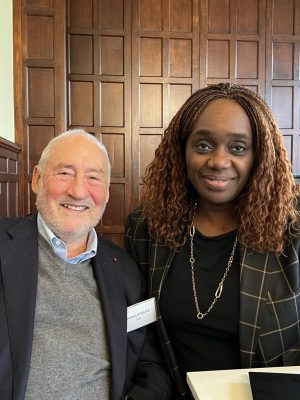Renowned economist and Nobel Prize Winner, Joseph Stiglitz and former Nigerian Minister of Finance, Mrs. Kemi Adeosun, have advocated international mechanisms for sovereign debt restructuring for Africa to assist the continent to achieve sustainable public finances.
The former Nigerian minister joined Joseph Stiglitz in a panel discussion on sovereign debt crises at the Columbia Global Centers in Paris on Tuesday.
Stiglitz stated that the lack of international mechanisms for sovereign debt restructuring has hampered the prospects for Africa achieving sustainable public finances or being able to contribute to the clean energy transition.
He said, “The difficulty of coordination between diverse creditors including China and Western hedge funds who don’t trust anyone else makes debt restructuring more difficult. We have no framework for debt restructuring across sovereigns and the result is too little debt restructuring, too late.
“Private sector lenders have shown they are not good at assessing risk, as evidenced by the Great Financial Crisis starting in 2008. Nothing has been learned by the West since. There are incentives not to learn and not to respond to what is predictable.”
Adeosun noted that the long periods needed to carry out debt restructuring such as that in Zambia have their roots in lack of action before a default takes place.
She pointed to a “failure to manage the pre-period”, adding that countries in debt distress are often reluctant to admit it due to the need to cut social spending, especially in democratic countries.
“That means there is a tendency to kick the can down the road,” said Adeosun who was Nigeria’s Finance Minister from November 2015 to September 2018.
She advised Eurobond holders to initiate conversations with sovereigns ahead of a potential default.
“If the sovereign is then able to keep servicing its debt, then there has been some loss of time, but when a restructuring is needed such conversations would ensure the process has a head start”, she added.
The huge debts of many African countries have posed a significant challenge in feeding their people as well as unable to spend to mitigate the effects of climate change.
Former Minister of Economy in Argentina, Martin Guzman, regretted the unsustainability of Africa’s sovereign debt.
Guzman said creditors and debtors have an incentive to delay restructuring in the hope that an institution such as the International Monetary Fund (IMF) will provide finance. READ ALSO:
- Judge Rules Woman Accusing Jay-Z Can Remain Anonymous Amid Legal Battle
- Adeleke Approves Adesuyi Haastrup As New Owa Obokun of Ijesha Land
- Sanwo-Olu gifts 6 cars to outstanding Lagos civil servants
- CHAN 2024Q: Black Galaxies Hit Uyo For Home Eagles Clash
- CSOs seek Tinubu’s intervention in UniAbuja VC’s tussle
“When companies are bankrupt, there are insolvency frameworks that can regulate the process, often while being able to keep the company running.
“We don’t have that for sovereigns. Most of the debt restructurings taking place now won’t fix the underlying problems and the sovereigns concerned will probably require more restructurings later, Guzman disclosed.


